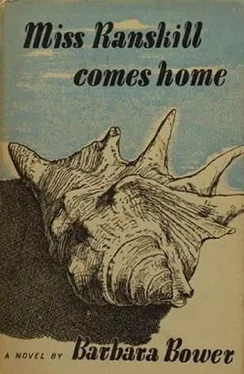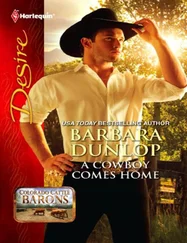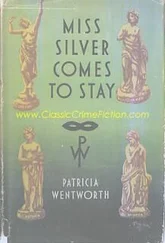Colin’s the one I want to see. He’ll be getting a big lad now. The girl was all for her mother and the first boy died like I told you, but I reckon Colin’ll remember his dad though he was only six then .
Steps sounded on a stairway inside the house and Miss Ranskill’s knuckles grew white as her fingernails met her palms. She was used to shocks by now. Supposing the boy, with the name that suggested a sheep-dog in all its faithful steadfastness, was a snivelling brat or a cock-a-hoop or –?
The door opened and he stood before her – a little Carpenter with the same grey eyes and serene forehead, the same stocky shoulders and nervous hands. She wanted to put an arm round him and take him away to some quiet field outside the village, there to tell him stories about his father, to weave the thread of the Carpenter’s eternity closer into the spiritual fabric of his son. This then was what she had come to do, not to pick flowers in woods or sip tea from thin china but to be a joiner.
Joiner and Carpenter, Miss Ranskill: there’s worse things than that.
She smiled suddenly and the boy responded, making confidence between them.
‘Mum’ll be down in a minute. She said you was to come in.’
There was reassurance in his manner of leading the way into the small kitchen.
Miss Ranskill looked first at the hearth. It was grey and dusty. She remembered the tale of the besom made for the ‘little lass’.
‘You’re Colin,’ she said. ‘You’re twelve years old, aren’t you?’
‘Yes. How did you know?’
But she couldn’t tell him that, not now and not here in this slatternly room with its filming of dust and the unwashed pans in the sink. She could not tell him anything yet: there was too much between them.
The boy did not seem to expect an answer, for his hands (his father’s hands) were busy about some pieces of wood on the table.
Seems to me, Miss Ranskill, seems to me the mind moves faster when the hands are moving too. Me, in a sort of way, I was always fanciful. When I’m planing a door, I’m thinking about the grain all right, but I think most of the door when it’s hung; and who it’ll open and shut on. Hands carry one on when they’re busy: they’re always learning themselves.
She noticed how the boy’s hands were being taught by the wood as he picked it up and put it, piece by piece, into a rush bag bound with webbing. He touched it in the way that some people fondle animals, communicating with them. His fingers curved, surely and gently as though the chisel had a bloom on it.
‘What are you making?’ she asked.
‘I was building a boat, but–’ he hesitated.
‘Yes?’
‘You need fine grain for a small one. I’ve only got rough bits here.’
‘Would you like to go to sea?’
‘Dad did.’
‘What’s that about Dad?’
The door had opened and Mrs Reid was standing on the threshold. She was dressed now in an artificial mauve satin blouse and an over-tight brown skirt. Powder covered the smeariness of her face: her hair frizzed bad-temperedly.
‘I was only saying that Dad went to sea.’
From the boy’s expression, Miss Ranskill guessed that the word only was in his constant use. It would often be necessary for him to explain that he was only doing that or thinking this, that it was quite harmless only he wished he could be left alone sometimes.
‘Yes, he went to sea right enough, and he didn’t come back. You’ll stay where you are and work and get that scholarship. Now clear that clutter away and look sharp about it.’ Mrs Reid turned to Miss Ranskill, ‘How anyone keeps a house to rights when there’s a boy in it, beats me. Dirt and litter all over the place!’
Miss Ranskill was looking at the place where the bowl of nasturtiums should have been set on the table, at the window-sill empty of the blossoming geranium, and at the rag rug where no cat lay.
A cat on the rug, a plant-pot in the window and a bunch of flowers on the side-table, they make home if you ask me, Miss Ranskill, they and a clean hearthstone. Stands to reason, doesn’t it, what’s the first thing you learn to read at school? The cat sat on the mat, of course, well then!
Something had gone wrong with the Carpenter’s home and badly wrong too; unless distance had made him see it rosily or pride lent loyalty to his tongue. Yet he had always spoken with conviction.
My missus says I’m a rare woman in the house, a home-maker, if you know what I mean, Miss Ranskill. It’s only fair to share the work.
‘Look sharp, can’t you, Colin? How many more times I’d like to know!’
When the boy had left them, Miss Ranskill tried to begin her story. She began by describing how she had fallen overboard and been washed ashore on the island.
‘It may seem queer to you that I should come to you like this, and begin to talk about myself, but I wanted to – to break it to you that there was somebody else on that island. I expect you believed as my sister did, I mean as my sister believed about me, that your husband was drowned a good many years ago, but–’
Miss Ranskill hesitated. She was telling the story very badly. She had been trying to build up a picture, but the words had all gone wrong.
‘Your husband – the Carpenter – wasn’t drowned after all. Oh! please ,’ she looked up into the unmoved face of the widow, ‘I hadn’t meant to raise your hopes. Forgive my clumsiness. Your husband isn’t alive now, but–’
‘I know that,’ said Mrs Reid. ‘I’ve known that for some weeks now.’
So there had been a link between them after all. His death had stirred some extra sense or intuition in the woman.
Miss Ranskill felt humble: she need not have seen herself as newsbreaker or worried about a choice of words. The Carpenter’s spirit, blowing where it listed, had ended the need for words.
Mrs Reid was the first to break the silence. She spoke conversationally.
‘So you’ll be the lady then?’
‘The – the lady?’
‘The lady that was on that island with him.’
A sudden chill jerked down Miss Ranskill’s spine; for an instant her heart felt icy. By what strange communication did the Carpenter’s wife know that she, Nona Ranskill, was ‘the lady that was on the island’?’
She looked into the woman’s eyes: they were pale, insignificant and rather wary, more the eyes of a shrew than of a clairvoyante.
‘From what they said, I thought you’d have been older, but then I don’t suppose you’d be feeling up to much.’
‘They?’ Miss Ranskill’s thoughts were whirling madly, as once a flight of sea-gulls had whirled above the Carpenter’s body.
Who were ‘They’, birds or voices, the kind of voices that the Maid of Orleans had heard?
‘Yes,’ continued Mrs Reid reminiscently, ‘you could have knocked me down with a feather when they told me. It didn’t seem natural somehow.’
No, it would not seem quite natural. And now a great curiosity overwhelmed Miss Ranskill. She leaned forward.
‘Who were “They?”’ she asked, and braced herself for the answer.
‘He was a good husband in his way,’ Mrs Reid made the statement automatically, almost as though she felt it were expected of her. ‘Headstrong always, but he wasn’t mean.’ She looked down at her lap, then at Miss Ranskill. ‘You’re quite sure he was dead? You made sure of that, I suppose. You’re certain he’s dead all right?’
‘Dead all right.’ Miss Ranskill, caught back from her memory of that morning on the beach, the knife in the grave and all the abomination of desolation that had followed, felt herself trembling a little. How could she make answer to a woman possessed of the strange knowledge that ‘They’ had made known to her?
Читать дальше












